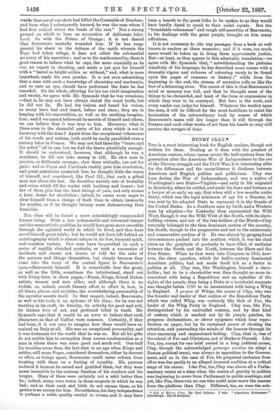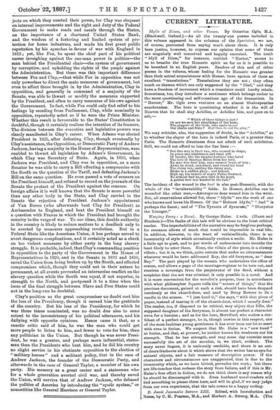HENRY CLAY.*
THIS is a most interesting book for English readers, though not written for them. Dealing as it does with the greatest of American orators, whose career covers the half-century from the generation after the American War of Independence to the eve of the Slavery straggle and the Civil War, it is interesting alike for the differences and the resemblances it discloses between American and English politics and politicians. Clay was born daring the War of Independence, and was a native of Washington's own State—Virginia—and early in life migrated to Kentucky, where he settled, and made his fame and fortune as a lawyer at so early an age, that when still a few months under thirty, which was the legal minimum of age for a Senator, he was sent by his adopted State to represent it in the Senate of the United States. As a Southern man by birth, and a Western man by adoption—for Kentucky then represented the Wild West, though it was the Wild West of the South, with its slave- holding owners, and not of the free-holders of the North—Clay naturally belonged to the then dominant section of the country, the South, though to the progressive and not to the aristocratic and conservative portion of it. He was almost by geographical circumstances pushed into the position which it was his chief claim on the gratitude of posterity to have filled, of mediator between the South and the North, between the Slave and the Free States. When he first went into Congress in 1806, how- ever, the slave question, which for half-a-century dominated American politics, had not made itself felt as a factor in politics at all. Clay was, like Washington, himself a slave- holder ; but to be a slaveholder was then thought no more in- consistent with being a Republican and an upholder of the rights of the people, than being a Duke or a territorial magnate was thought before 1793 to be inconsistent with being a Whig in England. 2 propos of Whigs, the career of Clay, who was the founder and leader of that section of the Republican Party which was called Whig, was curiously like that of Fox, the leader of the Whig Party in England. Clay was, like Fox, distinguished by his unrivalled oratory, and by that kind of oratory which is marked not by its purple patches, its gorgeous declamations, or clever epigrams which bear repro- duction on paper, but by its sustained power of riveting the attention, and persuading the minds of the hearers through its close reasoning and impassioned feeling. Clay, that is, was of the school of Fox and Gladstone, not of Burke or Disraeli. Like Fox, too, except for one brief period in a long political career, Clay, though the acknowledged princeps senates (to adapt a Roman political term), was always in opposition to the Govern- ment, and as in the case of Fox, his perpetual exclusion from office was due partly to an alleged immoral coalition at a critical stage of his career. Like Fox, too, Clay was above all a Parlia- mentary orator at a time when the centre of gravity in politics was beginning to move from Parliament to public meetings, and yet, like Fox, there was no one who could more move the masses from the platform than Clay. Different, too, as were the sub- • Life of Henry Clay. By Carl Schur& 2 vols. "American Statesmen." Edinburgh: David Douglas. jests on which they exerted their power, for Clay was eloquent on internal improvements and the right and duty of the Federal Government to make roads and canals through the States, on the importance of a chartered United States Bank, and the wisdom of a fostering and limited system of pro- tection for home industries, and made his first great public reputation by his speeches in favour of war with England in 1812 ; yet, like Fox, he spent the chief part of his political career inveighing against the one-man power in politics—the man behind the Presidential chair—the system of government by corruption, and upholding the rights of the people against the Administration. But there was this important difference between Fox and Clay,—that while Fox in opposition was not only powerless to direct the main measures of government, but even to affect those brought in by the Administration, Clay in opposition, and generally in command of a majority of the Senate, was able to thwart or modify the measures supported by the President, and often to carry measures of his own against the Government. In fact, while Fox could only find relief to his feelings by seceding from Parliament, Clay, while nominally in opposition, repeatedly acted as if he were the Prime Minister. Whether this result is favourable to the States' Constitution is doubtful, though it certainly realises the intention of its framers. The division between the executive and legislative powers was clearly manifested in Clay's career. When Adams was elected President in 1825, after defeating Clay, though eventually by Clay's assistance, the Opposition, or Democratic Party of Andrew Jackson, having a majority in the House of Representatives, were enabled to thwart all legislation by Adams's Government, in which Clay was Secretary of State. Again, in 1833, when Jackson was President, and Clay was in opposition, as a mere Senator he was able to carry a Bill effecting a compromise with the South on the question of the Tariff, and defeating Jackson's Bill on the same question. He even passed a vote of censure on the President himself, and refused to record on the journals of the .Senate the protest of the President against the censure. On foreign affairs it is well known that the Senate is more powerful than any other body in the State, and Clay carried in the Senate the rejection of President Jackson's appointment of Van Buren (who afterwards beat Clay for President) as Ambassador to England, and beat the President himself on a question with France in which the President bad brought the country to the verge of war. To our ideas, this double authority in the country is likely to reduce matters to a deadlock only to be averted by measures approaching revolution. But in a Federal State like the American Union, it has perhaps served to avert dangerous complications, and it certainly acted as a check on too violent measures by either party in the long slavery struggle. It is probable, indeed, that Clay's commanding position in opposition to the party of the Government in the House of Representatives in 1820, and in the Senate in 1833 and 1850, saved the Union from being broken up by the South, and effected compromises which, though they could not in their nature be permanent, at all events prevented an internecine conflict on the slavery question while the South was equal, if not superior, in strength to the North, and postponed it to a time when the issue of the final struggle between Slave and Free States could not in the long-run be doubtful.
Clay's position as the great compromiser no doubt cost him the lose of the Presidency, though it earned him the gratitude of the country. But his loss of the Presidency, for which he was three times nominated, was no doubt due also to some extent to the inconsistency of his political utterances, and his dallying with opposite opinions. Hence came it that, as a caustic critic said of him, he was the man who could get more people to listen to him, and fewer to vote for him, than any politician in the Union. But though he was never Presi- dent, he was a greater, and perhaps more influential, states- man than the Presidents who beat him, and he did his country no slight service in his obstinate opposition to the election of "military heroes" and a militant policy, first in the case of Andrew Jackson, the founder of the Democratic Party, and afterwards in the case of General Taylor, a member of his own party. His memory as a great orator and a statesman who for a whole generation averted civil war, and thereby saved
-the Union, will survive that of Andrew Jackson, who debased the polities of America by introducing the "spoils system," or nonentities like General Harrison or General Taylor.







































 Previous page
Previous page